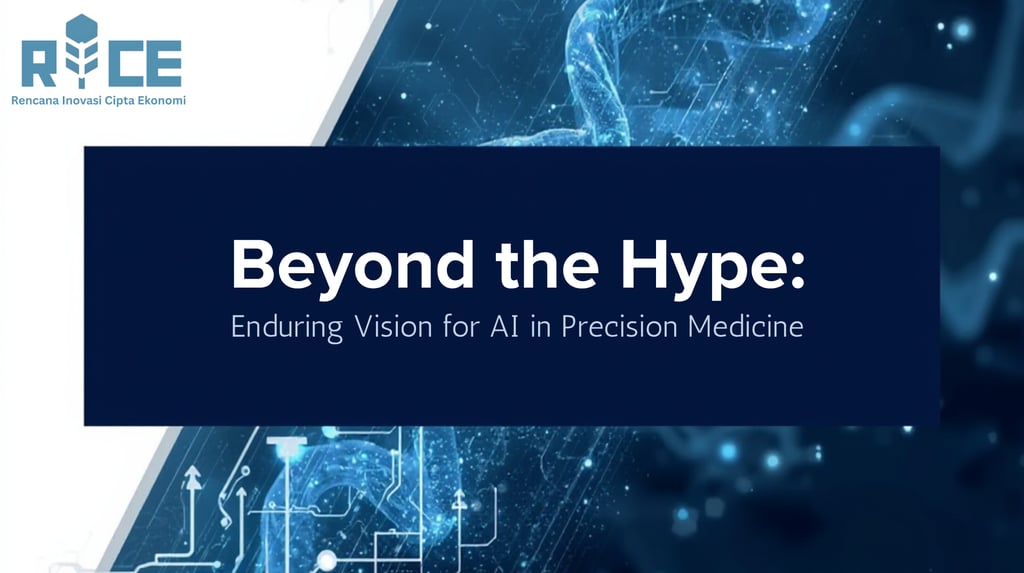Beyond the Hype: GE Healthcare's Enduring Vision for AI in Precision Medicine
This case study explores their journey from imaging to advanced AI, transforming care beyond hype.
INDUSTRIES
Rice AI (Ratna)
11/12/20257 min read


The promise of Artificial Intelligence (AI) in healthcare has long been a subject of both immense excitement and cautious skepticism. For decades, visionaries have predicted a revolution, while practitioners have awaited concrete, scalable solutions. Amidst this evolving landscape, GE Healthcare has emerged as a significant player, demonstrating a steadfast commitment to integrating AI into the very fabric of precision medicine, moving far "beyond the hype" through a strategic, long-term approach.
Precision medicine, which tailors medical treatment to the individual characteristics of each patient, stands to be profoundly transformed by AI. It requires the analysis of vast, complex datasets—from genomics and proteomics to imaging and electronic health records—to identify patterns, predict disease, and personalize therapies. GE Healthcare's journey in this domain offers a compelling historical case study, revealing the foresight, investment, and iterative development required to translate AI's potential into tangible clinical impact. This deep dive will explore GE Healthcare's methodical strategy, from foundational data infrastructure to advanced diagnostic and therapeutic applications, and the critical lessons for the broader industry.
Laying the Groundwork: Early Ventures into Digital Health
GE Healthcare’s historical footprint in medical technology provided a unique vantage point and a rich dataset to begin its AI journey long before the term became mainstream. Their enduring presence in critical healthcare sectors laid the essential foundation for subsequent advancements.
GE's Legacy in Medical Imaging and Data Collection
For over a century, GE has been synonymous with advancements in medical imaging. Technologies like X-ray, Computed Tomography (CT), Magnetic Resonance Imaging (MRI), and Ultrasound systems, developed and deployed globally, have generated an unparalleled volume of patient data. This continuous influx of high-resolution images, combined with associated clinical information, created a natural, organic data repository.
The introduction of Picture Archiving and Communication Systems (PACS) in the late 20th century further digitized this data, allowing for electronic storage, retrieval, and distribution of images and reports. These early digital health infrastructures, while not AI-driven themselves, were crucial precursors, normalizing digital workflows and demonstrating the power of centralized data access. They highlighted the potential for deeper analytical insights, setting the stage for AI's eventual integration.
Identifying the Potential: AI as an Augmentative Tool
Initially, the conversation around AI often revolved around automation, focusing on how machines could perform repetitive tasks faster. However, GE Healthcare early on recognized AI's more profound potential: to augment human capabilities rather than merely replace them. The focus shifted to developing AI solutions that could enhance the efficiency and accuracy of clinicians.
Early explorations centered on image analysis, particularly in radiology, where AI algorithms could assist in anomaly detection, identify subtle patterns, or prioritize urgent cases. This involved developing sophisticated algorithms capable of processing complex visual data, reducing variability, and assisting diagnosticians. The goal was to provide clinicians with a powerful co-pilot, improving diagnostic confidence and reducing cognitive load, thereby elevating the standard of care rather than simply streamlining processes.
Pivoting Towards Precision: Strategic AI Integration
As AI technologies matured and computational power increased, GE Healthcare made deliberate strategic shifts, cementing AI as a core pillar of its precision medicine strategy. These initiatives underscored a commitment to building scalable and interconnected AI ecosystems.
The Edison AI Platform and Ecosystem Approach
A pivotal moment in GE Healthcare’s AI journey was the introduction of the Edison AI platform. Recognizing the fragmented nature of AI development within healthcare, Edison was conceived as an integrated platform designed to accelerate the development, deployment, and adoption of AI applications across the enterprise and for third-party developers. It provided a common infrastructure, tools, and a marketplace for AI algorithms.
The platform aimed to overcome silos, enabling seamless data flow and application interoperability across various modalities and clinical workflows. This ecosystem approach facilitated rapid prototyping and deployment of new AI solutions, from image reconstruction algorithms to sophisticated diagnostic tools. Such platforms demonstrate the critical need for robust AI strategies that encompass not just technology but also a comprehensive operational framework. This is a core area where Rice AI specializes, guiding enterprises through the complexities of AI transformation, ensuring strategic alignment and operational readiness.
Key Acquisitions and Partnerships for AI Capabilities
To accelerate its AI ambitions, GE Healthcare strategically engaged in a series of acquisitions and partnerships. Rather than building every capability from scratch, the company sought to integrate specialized expertise and cutting-edge technologies. This included acquiring companies with deep domain knowledge in areas like advanced visualization, quantitative imaging analysis, and AI-powered diagnostics.
These strategic investments allowed GE Healthcare to rapidly expand its portfolio of AI-enabled solutions, integrating them into existing products and platforms. Collaborations with academic institutions and innovative startups further enriched its research and development pipeline, fostering a dynamic environment for AI innovation. These partnerships were critical for accessing novel algorithms, diverse datasets for training, and specialized talent pools.
Transforming Clinical Practice with AI-Powered Solutions
The true measure of AI's success lies in its ability to translate technological prowess into tangible improvements in clinical workflows and patient outcomes. GE Healthcare has focused on deploying AI solutions that deliver measurable value across the care continuum.
Enhancing Diagnostic Accuracy and Efficiency
AI has significantly impacted diagnostic imaging, one of GE Healthcare’s core strengths. AI-powered algorithms are now routinely used to enhance image quality, enabling faster scan times for MRI and CT while maintaining or even improving diagnostic resolution. This not only benefits patient comfort but also increases throughput for radiology departments. Moreover, AI aids in the detection of subtle lesions, microcalcifications, or early disease markers that might be challenging for the human eye to consistently identify, particularly under conditions of high workload.
By providing quantitative analysis and decision support, AI tools help reduce false positives and false negatives, leading to more accurate diagnoses. For example, AI applications can automatically segment organs, measure tumor volumes, or assess disease progression, freeing up radiologists and clinicians to focus on complex interpretation and patient interaction. These advancements represent a significant leap in clinical efficiency and diagnostic precision.
Driving Personalized Treatment Pathways
Beyond diagnosis, AI is playing an increasingly critical role in driving personalized or precision medicine, moving towards treatment pathways tailored to individual patients. AI algorithms can analyze a patient's genetic profile, imaging data, clinical history, and response to previous treatments to predict disease risk, forecast progression, and recommend optimal therapeutic interventions.
In oncology, for instance, AI can help clinicians select the most effective chemotherapy or radiation protocols based on tumor characteristics and patient biomarkers. In cardiology, AI models can predict the likelihood of adverse cardiac events, allowing for proactive preventative measures. This capability moves healthcare from a one-size-fits-all approach to a highly individualized strategy, promising better outcomes and reduced side effects. The seamless integration of such complex data and the development of predictive models require deep expertise in data science, machine learning, and ethical AI. These are areas where Rice AI is committed to excellence, ensuring that AI deployments are not only impactful but also responsible and aligned with the highest standards of patient care.
Overcoming Hurdles and Building Trust in Healthcare AI
The journey to widespread AI adoption in healthcare is fraught with challenges, from technical complexities to ethical considerations. GE Healthcare’s long-game approach has involved actively addressing these hurdles to build trust and ensure sustainable implementation.
Data Management, Interoperability, and Regulatory Compliance
One of the most significant challenges in healthcare AI is managing vast, diverse, and often siloed data. Healthcare data exists in myriad formats across different systems, making interoperability a constant battle. GE Healthcare has invested heavily in creating platforms and partnerships that facilitate data standardization and exchange, recognizing that robust AI models depend on access to high-quality, comprehensive data. Overcoming these barriers is essential for effective AI training and deployment.
Furthermore, the highly regulated nature of healthcare necessitates rigorous validation and approval processes. AI algorithms used for diagnosis or treatment planning must meet stringent regulatory requirements, such as those from the FDA, ensuring their safety and efficacy. This often involves extensive clinical trials and post-market surveillance. Coupled with this is the paramount importance of data security and patient privacy, with strict adherence to regulations like HIPAA and GDPR. Maintaining public trust demands absolute transparency and robust protection of sensitive health information.
Addressing Bias and Fostering Clinical Adoption
Algorithmic bias is a critical concern in healthcare AI. If AI models are trained on unrepresentative or biased datasets, they can perpetuate or even amplify existing health disparities, leading to inequitable care. GE Healthcare, alongside the broader industry, has focused on strategies to identify and mitigate bias, including diversifying training datasets and implementing fairness metrics in model development. This commitment ensures that AI tools benefit all patient populations equitably.
Beyond technical validation, fostering clinical adoption requires careful consideration of the user experience and continuous education. Clinicians must trust AI tools, understand their limitations, and feel confident in integrating them into their daily workflows. This involves designing intuitive interfaces, providing robust training, and demonstrating clear clinical utility and benefits. Without strong physician buy-in and a clear understanding of how AI augments their expertise, even the most advanced technologies will struggle to achieve widespread impact. Ethical AI development, which prioritizes fairness, transparency, and clinical relevance, is a cornerstone of responsible AI implementation, a principle that Rice AI champions in all its consulting engagements.
The Enduring Impact and Future Trajectory
GE Healthcare’s historical case study in AI-powered precision medicine illustrates a profound lesson: real transformation goes "beyond the hype" and requires a long-term, strategic commitment. Their journey underscores the importance of leveraging existing strengths, making targeted investments, building interconnected platforms, and diligently addressing the multifaceted challenges inherent in healthcare innovation. From digitizing medical images to deploying sophisticated diagnostic and therapeutic AI tools, GE Healthcare has demonstrated how to systematically integrate AI to enhance diagnostic accuracy, improve clinical efficiency, and drive personalized patient care.
Looking ahead, the future of AI in precision medicine is poised for even more revolutionary advancements. Areas like generative AI could assist in drug discovery or treatment plan optimization, while federated learning promises to unlock insights from diverse, decentralized datasets without compromising patient privacy. The continuous evolution of AI’s role will lead us towards a truly integrated healthcare ecosystem where AI supports not just reactive treatment but also proactive, preventative care, fundamentally reshaping how we approach health and wellness. Organizations can learn from GE Healthcare’s foresight and strategically partner with experts like Rice AI to develop and implement AI solutions that drive real-world impact. By adopting a similar strategic vision, enterprises can ensure their own "long game" in AI is successful, ethical, and future-proof, contributing to a healthier tomorrow.
What are your thoughts on the future of AI in precision medicine? Share your insights below or contact Rice AI to discuss your organization's AI strategy.
#GEHealthcare #AIinHealthcare #PrecisionMedicine #MedicalAI #HealthcareInnovation #DigitalHealth #EdisonAI #ClinicalAI #DiagnosticAI #PersonalizedMedicine #HealthcareTechnology #AITransformation #EthicalAI #RiceAI #FutureofHealthcare
RICE AI Consultant
To be the most trusted partner in digital transformation and AI innovation, helping organizations grow sustainably and create a better future.
Connect with us
Email: consultant@riceai.net
+62 822-2154-2090 (Marketing)
© 2025. All rights reserved.


+62 851-1748-1134 (Office)
IG: @riceai.consultant
